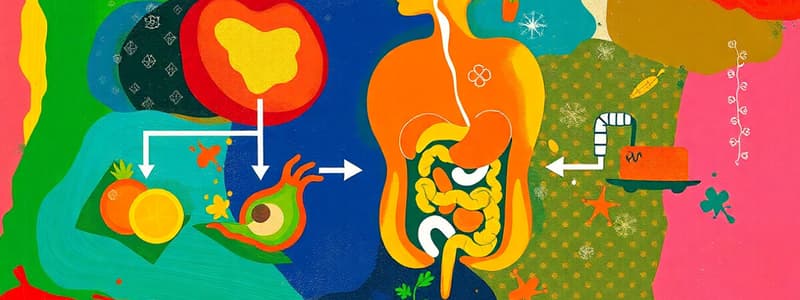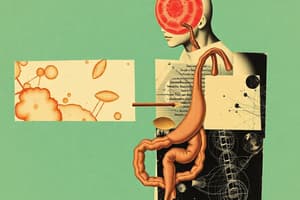Podcast
Questions and Answers
Which process follows ingestion in the sequence of nutrient processing in the body?
Which process follows ingestion in the sequence of nutrient processing in the body?
- Metabolism
- Digestion (correct)
- Excretion
- Absorption
In the context of nutrient delivery, what does the acronym 'W' represent regarding the timing of nutrient need?
In the context of nutrient delivery, what does the acronym 'W' represent regarding the timing of nutrient need?
- Where required
- With food
- What type
- When needed (correct)
Which of the following stages does not directly follow digestion in nutrient processing?
Which of the following stages does not directly follow digestion in nutrient processing?
- Transport
- Absorption
- Excretion (correct)
- Metabolism
What critical factor is necessary for effective nutrient processing according to the themes of the lecture?
What critical factor is necessary for effective nutrient processing according to the themes of the lecture?
Which of the following is primarily involved in the movement of molecules and atoms post-digestion?
Which of the following is primarily involved in the movement of molecules and atoms post-digestion?
What is a consequence of low cortisol levels in relation to glucose metabolism?
What is a consequence of low cortisol levels in relation to glucose metabolism?
Which symptom is NOT associated with Addisonian Crisis?
Which symptom is NOT associated with Addisonian Crisis?
In relation to nutrition for Addison's disease, which statement is inaccurate?
In relation to nutrition for Addison's disease, which statement is inaccurate?
Which mechanism is first compromised in the failure of counter-regulatory responses to hypoglycaemia?
Which mechanism is first compromised in the failure of counter-regulatory responses to hypoglycaemia?
Which complication is most directly linked to severe hypoglycaemia?
Which complication is most directly linked to severe hypoglycaemia?
What hormone is known to facilitate the uptake of glucose into body cells?
What hormone is known to facilitate the uptake of glucose into body cells?
Which component inhibits the secretion of insulin?
Which component inhibits the secretion of insulin?
What is the primary action of glucagon in the body?
What is the primary action of glucagon in the body?
Which hormone is cosecreted with insulin and delays nutrient uptake?
Which hormone is cosecreted with insulin and delays nutrient uptake?
Which hormone promotes the secretion of glucagon?
Which hormone promotes the secretion of glucagon?
Pancreatic polypeptide may have an effect on which aspect of insulin secretion?
Pancreatic polypeptide may have an effect on which aspect of insulin secretion?
What is the main function of amylin in relation to glucagon?
What is the main function of amylin in relation to glucagon?
Which cells in the pancreas secrete insulin?
Which cells in the pancreas secrete insulin?
Which hormone primarily stimulates gluconeogenesis and contributes to insulin resistance?
Which hormone primarily stimulates gluconeogenesis and contributes to insulin resistance?
What is a possible cause of reactive hypoglycemia?
What is a possible cause of reactive hypoglycemia?
Which of the following is NOT typically associated with fasting hypoglycemia?
Which of the following is NOT typically associated with fasting hypoglycemia?
Which symptom is commonly associated with worsening hypoglycemia?
Which symptom is commonly associated with worsening hypoglycemia?
What is the immediate treatment for low blood glucose levels?
What is the immediate treatment for low blood glucose levels?
Which medication class is associated with causing hypoglycemia?
Which medication class is associated with causing hypoglycemia?
What effect does a tumor in the pancreas that produces insulin have on blood glucose levels?
What effect does a tumor in the pancreas that produces insulin have on blood glucose levels?
Which of the following is a common symptom of hypoglycemia?
Which of the following is a common symptom of hypoglycemia?
What is a recommended practice for managing meals and snacks for individuals on insulin or diabetes medication?
What is a recommended practice for managing meals and snacks for individuals on insulin or diabetes medication?
Which of the following can lead to diabetic hypoglycemia?
Which of the following can lead to diabetic hypoglycemia?
What symptom may indicate that hypoglycemia is worsening?
What symptom may indicate that hypoglycemia is worsening?
When consuming alcohol, what should individuals with diabetes ensure?
When consuming alcohol, what should individuals with diabetes ensure?
Which dietary strategy is emphasized in managing nutrition for individuals with diabetes?
Which dietary strategy is emphasized in managing nutrition for individuals with diabetes?
What should be adjusted if an individual increases their physical activity while on diabetes medication?
What should be adjusted if an individual increases their physical activity while on diabetes medication?
What is a potential long-term complication of consuming alcohol on an empty stomach for individuals with diabetes?
What is a potential long-term complication of consuming alcohol on an empty stomach for individuals with diabetes?
What is the primary goal of special diets in the context of metabolic needs?
What is the primary goal of special diets in the context of metabolic needs?
Which statement accurately describes insulin's action on glucose uptake?
Which statement accurately describes insulin's action on glucose uptake?
What is the primary target tissue for glucagon's action?
What is the primary target tissue for glucagon's action?
How does glucagon contribute to plasma glucose regulation?
How does glucagon contribute to plasma glucose regulation?
What role do the β-cells of the pancreas play in glucose metabolism?
What role do the β-cells of the pancreas play in glucose metabolism?
What happens to blood glucose levels after food ingestion in a normal individual?
What happens to blood glucose levels after food ingestion in a normal individual?
What is the physiological response of the body when glucagon binds to its receptor?
What is the physiological response of the body when glucagon binds to its receptor?
Which of the following statements is true regarding the role of carbohydrates in the body?
Which of the following statements is true regarding the role of carbohydrates in the body?
How does insulin impact plasma glucose levels in the body?
How does insulin impact plasma glucose levels in the body?
Which stage of nutrient processing involves the physical and chemical breakdown of food into smaller molecules?
Which stage of nutrient processing involves the physical and chemical breakdown of food into smaller molecules?
What is the defining feature of Addison's Disease that impacts glucose metabolism?
What is the defining feature of Addison's Disease that impacts glucose metabolism?
In the context of nutrient delivery, what does the acronym 'Q' emphasize?
In the context of nutrient delivery, what does the acronym 'Q' emphasize?
Which sequence accurately represents the flow of nutrient processing after ingestion?
Which sequence accurately represents the flow of nutrient processing after ingestion?
What constitutes a significant dietary consideration for individuals with hypoglycemia?
What constitutes a significant dietary consideration for individuals with hypoglycemia?
What is the appropriate portion size of protein recommended in a special diet?
What is the appropriate portion size of protein recommended in a special diet?
Which of the following represents an appropriate serving of dairy in a special diet?
Which of the following represents an appropriate serving of dairy in a special diet?
In a heart health diet, which type of cholesterol is mostly associated with contributing to atherosclerosis?
In a heart health diet, which type of cholesterol is mostly associated with contributing to atherosclerosis?
What percentage of total calories is recommended for total fat intake in the TLC diet?
What percentage of total calories is recommended for total fat intake in the TLC diet?
Which plant protein serving is appropriate in a special diet?
Which plant protein serving is appropriate in a special diet?
Which of the following is a cause of reactive hypoglycemia?
Which of the following is a cause of reactive hypoglycemia?
What can happen if glucagon fails to achieve euglycemia in detail?
What can happen if glucagon fails to achieve euglycemia in detail?
Which symptom is an early indicator of hypoglycemia that may worsen if untreated?
Which symptom is an early indicator of hypoglycemia that may worsen if untreated?
Which hormonal deficiency is associated with fasting hypoglycemia?
Which hormonal deficiency is associated with fasting hypoglycemia?
What is the immediate treatment recommended for low blood glucose levels?
What is the immediate treatment recommended for low blood glucose levels?
Which of the following medications is associated with causing hypoglycemia?
Which of the following medications is associated with causing hypoglycemia?
What can serious illnesses affecting the liver lead to concerning blood glucose levels?
What can serious illnesses affecting the liver lead to concerning blood glucose levels?
Which of the following is NOT a typical symptom of hypoglycemia?
Which of the following is NOT a typical symptom of hypoglycemia?
Which type of diet specifically addresses the dietary restrictions necessary for managing chronic kidney disease?
Which type of diet specifically addresses the dietary restrictions necessary for managing chronic kidney disease?
What dietary component is primarily restricted to maintain kidney function and manage chronic kidney disease?
What dietary component is primarily restricted to maintain kidney function and manage chronic kidney disease?
Which food item is considered high in potassium and should be limited in a chronic kidney disease diet?
Which food item is considered high in potassium and should be limited in a chronic kidney disease diet?
What is a common characteristic of foods lower in phosphorus per the dietary guidelines for chronic kidney disease?
What is a common characteristic of foods lower in phosphorus per the dietary guidelines for chronic kidney disease?
Which sodium-rich food should be avoided in a chronic kidney disease diet?
Which sodium-rich food should be avoided in a chronic kidney disease diet?
What role does Spironolactone play in the management of chronic kidney disease?
What role does Spironolactone play in the management of chronic kidney disease?
Which category of foods should be emphasized in a chronic kidney disease diet to minimize potassium intake?
Which category of foods should be emphasized in a chronic kidney disease diet to minimize potassium intake?
What dietary modification is recommended as chronic kidney disease progresses across its stages?
What dietary modification is recommended as chronic kidney disease progresses across its stages?
Which of the following foods is lower in phosphorus that can be included in a chronic kidney disease diet?
Which of the following foods is lower in phosphorus that can be included in a chronic kidney disease diet?
What characteristic describes the recommended dietary approach as renal disease stages progress?
What characteristic describes the recommended dietary approach as renal disease stages progress?
Which hormone is synthesized from proinsulin?
Which hormone is synthesized from proinsulin?
What effect does somatostatin have on insulin secretion?
What effect does somatostatin have on insulin secretion?
Which hormone is responsible for stimulating glycogenolysis and gluconeogenesis?
Which hormone is responsible for stimulating glycogenolysis and gluconeogenesis?
Which factor decreases the secretion of glucagon?
Which factor decreases the secretion of glucagon?
What is the primary function of amylin in relation to nutrient absorption?
What is the primary function of amylin in relation to nutrient absorption?
Which of the following hormones may increase insulin sensitivity?
Which of the following hormones may increase insulin sensitivity?
What effect does ghrelin have on glucagon secretion?
What effect does ghrelin have on glucagon secretion?
Which pancreatic cells are responsible for insulin secretion?
Which pancreatic cells are responsible for insulin secretion?
What is the primary function of the insulin receptor upon binding with insulin?
What is the primary function of the insulin receptor upon binding with insulin?
What occurs after glucagon binds to its receptor in the liver?
What occurs after glucagon binds to its receptor in the liver?
Which of the following accurately describes how insulin influences glucose levels in the body?
Which of the following accurately describes how insulin influences glucose levels in the body?
What is the mechanism through which glucose transport proteins operate after insulin binds to receptors in cells?
What is the mechanism through which glucose transport proteins operate after insulin binds to receptors in cells?
What is the role of glucagon in regulating plasma glucose concentration?
What is the role of glucagon in regulating plasma glucose concentration?
How do β-cells of the pancreas contribute to glucose metabolism?
How do β-cells of the pancreas contribute to glucose metabolism?
What physiological change is observed in blood glucose concentration following carbohydrate ingestion?
What physiological change is observed in blood glucose concentration following carbohydrate ingestion?
Which statement accurately reflects the interaction between insulin and the central nervous system's use of glucose?
Which statement accurately reflects the interaction between insulin and the central nervous system's use of glucose?
Flashcards
Ingestion (I)
Ingestion (I)
Getting nutrients into the body through oral intake, feeding tubes, intravenous (IV), or central lines.
Digestion (D)
Digestion (D)
Breaking down food and molecules in the mouth and gastrointestinal tract into individual molecules and atoms.
Absorption (A)
Absorption (A)
The movement of molecules and atoms from the GI tract into the body.
Special Diets
Special Diets
Signup and view all the flashcards
Hypoglycemia
Hypoglycemia
Signup and view all the flashcards
Counter-regulatory Mechanisms
Counter-regulatory Mechanisms
Signup and view all the flashcards
Reactive Hypoglycemia
Reactive Hypoglycemia
Signup and view all the flashcards
Fasting Hypoglycemia
Fasting Hypoglycemia
Signup and view all the flashcards
Hypoglycemia Symptoms
Hypoglycemia Symptoms
Signup and view all the flashcards
Severe Hypoglycemia Symptoms
Severe Hypoglycemia Symptoms
Signup and view all the flashcards
Treating Hypoglycemia
Treating Hypoglycemia
Signup and view all the flashcards
Hormonal Causes of Fasting Hypoglycemia
Hormonal Causes of Fasting Hypoglycemia
Signup and view all the flashcards
Tumors & Hypoglycemia
Tumors & Hypoglycemia
Signup and view all the flashcards
Diabetic Hypoglycemia
Diabetic Hypoglycemia
Signup and view all the flashcards
Hypoglycemia Prevention
Hypoglycemia Prevention
Signup and view all the flashcards
Special Diets for Diabetes
Special Diets for Diabetes
Signup and view all the flashcards
Why Special Diets Work
Why Special Diets Work
Signup and view all the flashcards
W, W, F, Q
W, W, F, Q
Signup and view all the flashcards
Special Diets and Disease Prevention
Special Diets and Disease Prevention
Signup and view all the flashcards
Special Diets and Conditions
Special Diets and Conditions
Signup and view all the flashcards
Insulin's Role
Insulin's Role
Signup and view all the flashcards
What Stimulates Insulin Release?
What Stimulates Insulin Release?
Signup and view all the flashcards
Amylin: Insulin's Partner
Amylin: Insulin's Partner
Signup and view all the flashcards
Glucagon's Role
Glucagon's Role
Signup and view all the flashcards
Pancreatic Somatostatin
Pancreatic Somatostatin
Signup and view all the flashcards
How Does Gastrin Influence Insulin?
How Does Gastrin Influence Insulin?
Signup and view all the flashcards
Ghrelin and Glucagon: A Partnership?
Ghrelin and Glucagon: A Partnership?
Signup and view all the flashcards
Pancreatic Polypeptide's Role
Pancreatic Polypeptide's Role
Signup and view all the flashcards
Addisonian Crisis
Addisonian Crisis
Signup and view all the flashcards
Addison's Disease Nutrition
Addison's Disease Nutrition
Signup and view all the flashcards
Why Low Cortisol Leads to Hypoglycemia
Why Low Cortisol Leads to Hypoglycemia
Signup and view all the flashcards
First Line of Defense Against Hypoglycemia
First Line of Defense Against Hypoglycemia
Signup and view all the flashcards
Second Line of Defense Against Hypoglycemia
Second Line of Defense Against Hypoglycemia
Signup and view all the flashcards
Insulin Receptor
Insulin Receptor
Signup and view all the flashcards
Insulin's Role in Glucose Uptake
Insulin's Role in Glucose Uptake
Signup and view all the flashcards
Glucagon Receptor
Glucagon Receptor
Signup and view all the flashcards
Glucagon's Action: Glucose Release
Glucagon's Action: Glucose Release
Signup and view all the flashcards
Glucose Transport Protein
Glucose Transport Protein
Signup and view all the flashcards
How Insulin Decreases Blood Glucose
How Insulin Decreases Blood Glucose
Signup and view all the flashcards
Carbohydrate Metabolism: Insulin's Role
Carbohydrate Metabolism: Insulin's Role
Signup and view all the flashcards
Normal Postprandial Glucose Regulation
Normal Postprandial Glucose Regulation
Signup and view all the flashcards
Addison's Disease
Addison's Disease
Signup and view all the flashcards
Hypoglycemia in Addison's Disease
Hypoglycemia in Addison's Disease
Signup and view all the flashcards
Non-Diabetic Hypoglycemia
Non-Diabetic Hypoglycemia
Signup and view all the flashcards
Special Diet for Addison's
Special Diet for Addison's
Signup and view all the flashcards
What are some signs of hypoglycemia?
What are some signs of hypoglycemia?
Signup and view all the flashcards
How can you treat hypoglycemia?
How can you treat hypoglycemia?
Signup and view all the flashcards
Growth Hormone's Role in Hypoglycemia
Growth Hormone's Role in Hypoglycemia
Signup and view all the flashcards
What Triggers Insulin Release?
What Triggers Insulin Release?
Signup and view all the flashcards
Gastrin's Influence on Insulin
Gastrin's Influence on Insulin
Signup and view all the flashcards
Ghrelin and Glucagon
Ghrelin and Glucagon
Signup and view all the flashcards
What is a TLC diet?
What is a TLC diet?
Signup and view all the flashcards
What are the main components of a TLC diet?
What are the main components of a TLC diet?
Signup and view all the flashcards
What are the benefits of a TLC diet?
What are the benefits of a TLC diet?
Signup and view all the flashcards
What kinds of foods should be reduced in a TLC diet?
What kinds of foods should be reduced in a TLC diet?
Signup and view all the flashcards
What are some examples of heart-healthy foods that should be included in a TLC diet?
What are some examples of heart-healthy foods that should be included in a TLC diet?
Signup and view all the flashcards
Renal Diet
Renal Diet
Signup and view all the flashcards
Chronic Kidney Disease (CKD) Diet
Chronic Kidney Disease (CKD) Diet
Signup and view all the flashcards
Low Phosphorus Foods
Low Phosphorus Foods
Signup and view all the flashcards
Low Potassium Foods
Low Potassium Foods
Signup and view all the flashcards
Low Sodium Foods
Low Sodium Foods
Signup and view all the flashcards
Aproteid Diet
Aproteid Diet
Signup and view all the flashcards
High Protein Foods
High Protein Foods
Signup and view all the flashcards
Low Protein Foods
Low Protein Foods
Signup and view all the flashcards
Spironolactone (Aldolactone)
Spironolactone (Aldolactone)
Signup and view all the flashcards
Dialysis
Dialysis
Signup and view all the flashcards
Study Notes
Addison's Disease
- Addison's disease, also called adrenal insufficiency, is a rare disorder
- It occurs when the body does not produce enough cortisol and often too little aldosterone
- It affects people of all ages and both sexes
- It can be life-threatening
Addison's Disease - Etiology
- Autoimmune attack on the adrenal gland
- Tuberculosis (most common worldwide, but more common in developing countries)
- Infections (AIDS, fungal)
- Adrenal hemorrhage (caused by sepsis, meningitis)
- Metastatic spread to the adrenals
- Amyloidosis
- Adrenalectomy
- Genetic/congenital defects
Addison's Disease - Pathophysiology
- Hyponatremia due to low cortisol, increasing vasopressin secretion/action and inability to excrete free water
- Low aldosterone causing hyperkalemia
- High adrenocorticotropic hormone (ACTH) due to low cortisol
- Low glucose (cortisol stimulates glycogenolysis, increased glucagon release, and gluconeogenesis; low cortisol increases insulin sensitivity)
Addison's Disease - Nutrition
- Higher sodium intake
- Increased vitamin D and calcium intake if on high-dose corticosteroids
- Lower potassium intake if necessary
- Comfort foods (high simple sugars) if reported
Hypoglycemia - General
- Diabetic and non-diabetic hypoglycemia
- Failure of counter-regulatory mechanisms
- Decreases in insulin production
Hypoglycemia: Aetiology & Pathophysiology
- Hepatic glycogenolysis and low insulin levels are necessary for decreased insulin production
- Plasma glucose levels decline, leading to increased hepatic gluconeogenesis and hepatic glycogenolysis
- Glycogenolysis maintains serum glucose levels 8-12 hours until glycogen stores are depleted
- Hepatic gluconeogenesis contributes to maintaining euglycemia
- Pancreatic alpha cell secretion of glucagon is the next line of defense against hypoglycemia
- Adrenomedullary measures can be necessary if glucagon fails to achieve euglycemia
Hypoglycemia - Non-Diabetic: Aetiology
- Reactive hypoglycemia
- Fasting hypoglycemia
- Pre-diabetes or risk of diabetes
- Stomach surgery
- Rare enzyme deficiencies
- Medicines (e.g., salicylates, sulfa drugs, quinine, pentamidine)
- Alcohol (especially binge drinking)
- Serious illnesses (e.g., liver, heart, kidneys)
- Low levels of certain hormones (e.g., cortisol, growth hormone, glucagon, epinephrine)
- Tumors (e.g., pancreas, IGF-II)
- Inadequate food intake
Hypoglycemia - Non-Diabetic: Pathophysiology
- Irregular or fast heartbeat
- Fatigue
- Pale skin
- Shakiness
- Anxiety
- Sweating
- Hunger
- Irritability
- Tingling or numbness of lips, tongue, or cheek
- Confusion, abnormal behavior
- Visual disturbances
- Seizures
- Loss of consciousness
Hypoglycemia - Non-Diabetic: Nutrition
- Immediate treatment with 15 grams of carbohydrates (e.g., juice, glucose tablets, hard candy)
- Frequent small meals and snacks throughout the day (every 3 hours)
- Variety of foods including protein, dairy, high-fiber foods (e.g., whole-grain bread, fruit, vegetables)
- Limit high-sugar foods
Hypoglycemia - Diabetic: Aetiology
- Taking too much insulin or diabetes medication
- Not eating enough
- Skipping or postponing a meal or snack
- Increased exercise or physical activity without adjusting intake
- Drinking alcohol
Hypoglycemia - Diabetic: Pathophysiology
- Similar symptoms to non-diabetic hypoglycemia
Hypoglycemia - Diabetic: Nutrition
- Do not skip or delay meals/snacks
- Be consistent with insulin/medication amounts and timing
- Adjust medication or eat additional snacks if increasing activity levels
- Eat a meal/snack with alcohol if drinking to avoid delayed hypoglycemia
Special Diets - General
- Special diets are used to treat or prevent conditions
- Specific modified diets include changes in texture, nutrient level, frequency/timing of meals, and exclusions
- Examples include renal, heart health, malabsorption, and iron deficiency anemia diets
Special Diets - Renal Diet
- Required for chronic kidney disease
- Restricts protein and other nutrients (fluid, sodium, potassium, phosphorus)
- Restriction increases as CKD progresses
- Dialysis may be required at stage 5
- Specific food lists for higher/lower phosphorus and potassium contents
- Potential drug use (e.g., spironolactone)
Special Diets - Heart Health Diet
- Primarily for post-onset metabolic syndrome management
- Lower saturated fat, less than 7% of total calories
- Increase polyunsaturated and monounsaturated fats (up to 10% and 20% of total calories, respectively)
- Increase carbs (50-60% total calories) and fiber (20-30 grams per day)
- Lower cholesterol, less than 200 mg/day, and sodium, less than 2,300 mg/day
Special Diets - Malabsorption Syndrome
- Poor nutrient absorption (digestive or absorption impairment)
- Can occur due to various issues (e.g., lactase activity reduction, coeliac disease)
- Eat small frequent meals (5-6/day)
- Reduce high-fat foods
- Reduce/avoid high-fiber foods
- Consider vitamin/mineral supplementation if necessary
- Drink liquids between meals
Special Diets - Iron Deficiency Anemia
- Low iron levels in the body
- Poor iron absorption
- Increased iron requirements
- Increase heme iron-rich foods or dietary vitamin C
- Iron supplements might be needed if diet is not sufficient
Studying That Suits You
Use AI to generate personalized quizzes and flashcards to suit your learning preferences.




